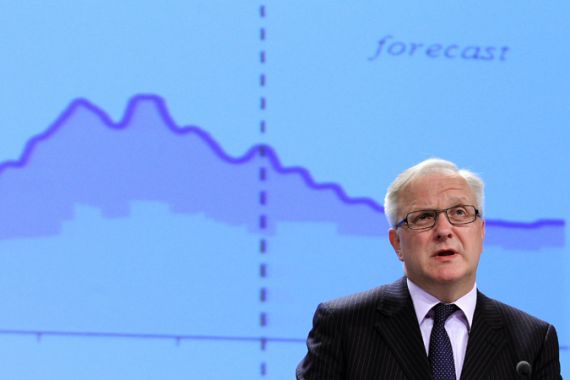EU economy still in doldrums
Despite progress on debt crisis, economy is undergoing “difficult process of macroeconomic rebalancing”, says official.

Europe’s economy is still struggling and unemployment could remain high for years despite the progress made in solving the debt crisis, the European Union (EU) has warned.
The EU’s executive arm, the European Commission, on Wednesday revised down its forecast for the region’s gross domestic product. It now expects GDP to grow by just 0.4 per cent in 2013, compared to its expectations this spring of 1.3 per cent growth.
Keep reading
list of 4 itemsUS imposes new sanctions on Iran after attack on Israel
A flash flood and a quiet sale highlight India’s Sikkim’s hydro problems
Why is Germany maintaining economic ties with China?
The commission had previously expected the 17 countries that use the euro to find its footing next year, with 1 per cent growth. Now it predicts only a 0.1 per cent uptick.
The report also suggests that unemployment will not start falling until 2014 – and then only slightly.
“Europe is going through a difficult process of macroeconomic rebalancing and adjustment, which will last for some time still,” Olli Rehn, the EU’s economic and monetary affairs commissioner, told reporters.
“Market stress has been reduced but there is certainly no room for complacency.”
The eurozone has made progress this year towards resolving its debt crisis, which has been dragging down economies throughout the EU and beyond.
Countries that use the euro have cut spending and promised to keep their deficits in check.
Other measures include protecting banks by improving how they are regulated and supervised.
The European Central Bank has also put in place a plan to help countries struggling with high borrowing costs, the hallmark of the crisis and the reason some have sought bailouts.
Record unemployment
But those measures have not yet been felt in the real economy as the unemployment rate across the eurozone remains at a record high of 11.6 per cent, and it is 10.6 percent in the wider EU.
In the latest in a steady stream of job cuts, Danish wind turbine maker Vestas, Swedish wireless equipment group LM Ericsson, and Dutch bank ING announced a total of almost 7,000 layoffs on Wednesday.
Eurostat, the EU’s statistics agency, also said retail sales in the eurozone shrank 0.2 per cent in September.
This commission’s predictions for this year reflect that grim reality. It expects the EU’s economy to contract by 0.3 per cent, rather than remaining flat as it forecast in the spring.
It also predicts that the eurozone GDP will fall 0.4 per cent, against a previous expectation of a 0.3 per cent drop.
Official third-quarter GDP figures – which will show whether the eurozone has entered recession as economists suspect it has – are due to be released on November 15.
A recession is defined as two quarters in a row with negative GDP growth.
Many economists have argued that, in solving one crisis by cutting government spending and raising taxes, politicians have exacerbated another – slow or negative growth.
Meanwhile, tighter banking rules have hurt lending, the fuel economies need to grow.
The commission’s report also confirms that the crisis is not sparing even Germany, Europe’s largest economy and the traditional motor for growth.
Greece hit most
It predicted that Germany would eke out just 0.8 per cent growth in 2012, compared with its earlier forecast of 1.7 per cent.
Mario Draghi, the ECB chief, warned on Wednesday that “the latest data suggest that these developments are now starting to affect” the German economy.
Greece has suffered the most from the vicious slow growth cycle and is now in its fifth year of recession.
Many say it is unclear how the country will ever manage to reduce its debts, restore growth and break the cycle. The new forecast expects Greece’s economy to contract 6 per cent this year and another 4.2 per cent next year. In the spring, the commission had hoped growth would be flat in 2013.
There are fears stagnation could throw countries off their deficit targets as low or negative growth reduces the amount of money governments receive in taxes.
According to the report, both Greece and Spain will not meet their goal of reducing their deficits to 3 per cent by 2014. It predicts Greece’s will be 4.5 per cent at that point and Spain’s 6.4 per cent.
In Greece’s case, that could mean jeopardising the rescue loans it is using to fund itself. Greece has asked its international creditors for more time to reach its goal.
Monetary affairs commissioner Rehn said on Wednesday that the country’s debt levels looked increasingly unsustainable and that something had to be done, but he stopped short of saying what.